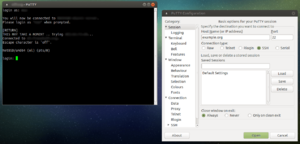PuTTY facts for kids

A screenshot of PuTTY running under Ubuntu MATE
|
|
| Developer(s) | Simon Tatham |
|---|---|
| Initial release | January 8, 1999 |
| Stable release | |
| Written in | C |
| Operating system | Microsoft Windows, ReactOS, macOS, Linux |
| Type | Terminal emulator |
| License | MIT License |
PuTTY is a special computer program. It helps you connect to other computers or devices from far away. Think of it like a secure phone line for your computer!
This program is free to use and its code is open-source. This means anyone can look at how it works. PuTTY lets you use different ways to connect, like SSH for secure connections. It can also connect to a serial port, which is a way for computers to talk to other devices directly.
PuTTY was first made for computers using Microsoft Windows. But it has been changed to work on many other computer systems too. You can find official versions for Unix-like systems and even some for macOS. People have also made unofficial versions for phones and other devices.
A British programmer named Simon Tatham created PuTTY. He is still the main person who works on it.
Contents
What PuTTY Can Do
PuTTY has many cool features that help you connect to other computers safely.
Secure Connections
PuTTY is great for secure connections. It lets you control how your data is encrypted. Encryption is like scrambling your messages so only the right person can read them. PuTTY uses strong encryption methods like AES.
It also uses special digital keys to make sure you are connecting to the right computer. These keys are stored in a special format called PPK. PuTTY can also help you log in without typing your password every time. This is called SSO.
Different Terminal Types
PuTTY can act like different kinds of computer terminals. This means it can pretend to be older computer screens. This helps it work with many different systems. It can also send your computer's display to another computer. This is called X11 forwarding.
Network Connections
PuTTY works with modern internet connections, including IPv6. It can also make your connection faster by compressing data. This is like squishing a big file into a smaller one before sending it. You can also use PuTTY to connect to local devices through a serial port.
Extra Tools
PuTTY comes with other helpful tools:
- PSCP: This tool helps you copy files securely between computers. It works from the command line, which is like typing commands instead of clicking buttons.
- PSFTP: This is another tool for transferring files securely. It's similar to regular FTP but much safer.
- Plink: This tool lets you connect to other computers using commands. It's often used for special secure connections called SSH Tunneling.
PuTTY itself doesn't have tabs for different connections. But other programs can add this feature to PuTTY.
PuTTY's History
The development of PuTTY started a long time ago in 1996. By October 2000, it was already a useful program for secure connections.
PuTTY's Parts
PuTTY is actually a collection of several programs that work together:
- PuTTY: This is the main program. It's the client that connects to other computers using Telnet, rlogin, or SSH. It can also connect to a serial port.
- PSCP: This is a command-line tool for securely copying files.
- PSFTP: This is a command-line tool for secure file transfers, similar to FTP.
- PuTTYtel: This is a simpler version of PuTTY that only uses Telnet connections.
- Plink: This is a command-line tool for making connections. It's often used for automated tasks.
- Pageant: This program helps you manage your secure keys. It makes logging in easier and safer.
- PuTTYgen: This tool helps you create new secure keys. These keys are important for secure connections.
- pterm: (Only for Unix systems) This is a special window that acts like a terminal. It works just like the main PuTTY program.
See also
 In Spanish: PuTTY para niños
In Spanish: PuTTY para niños
- Comparison of SSH clients
- Tera Term
- mintty
- WinSCP
- minicom

